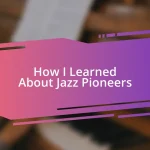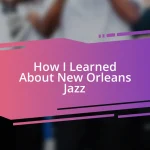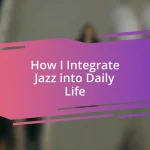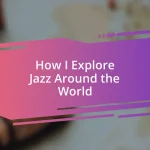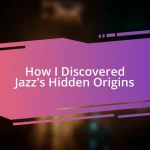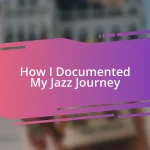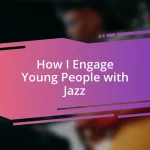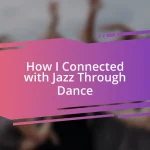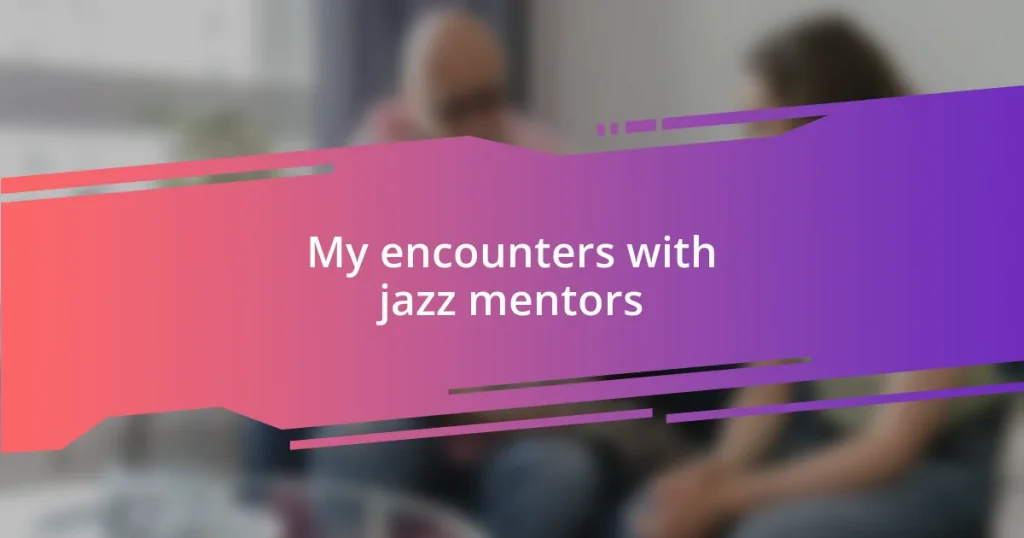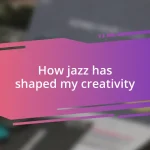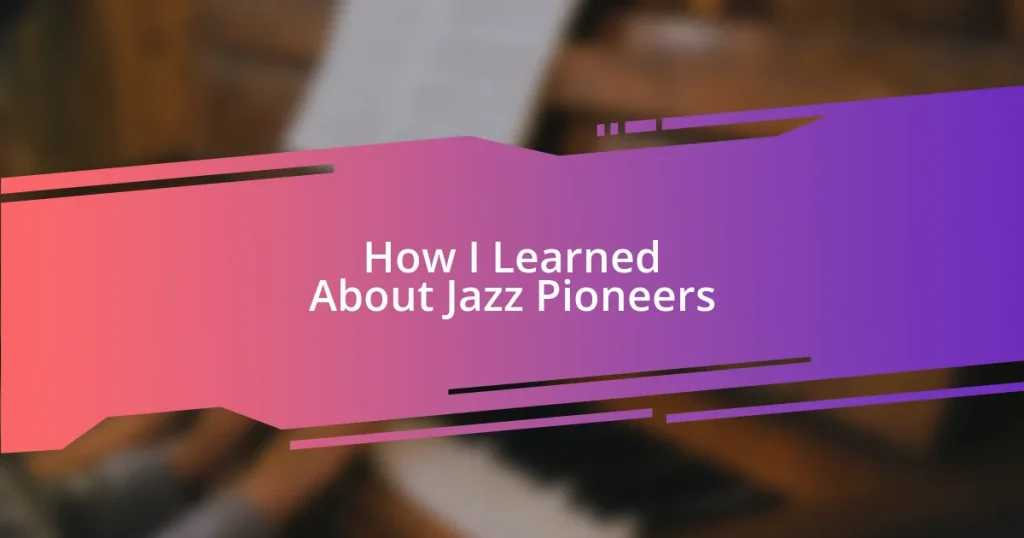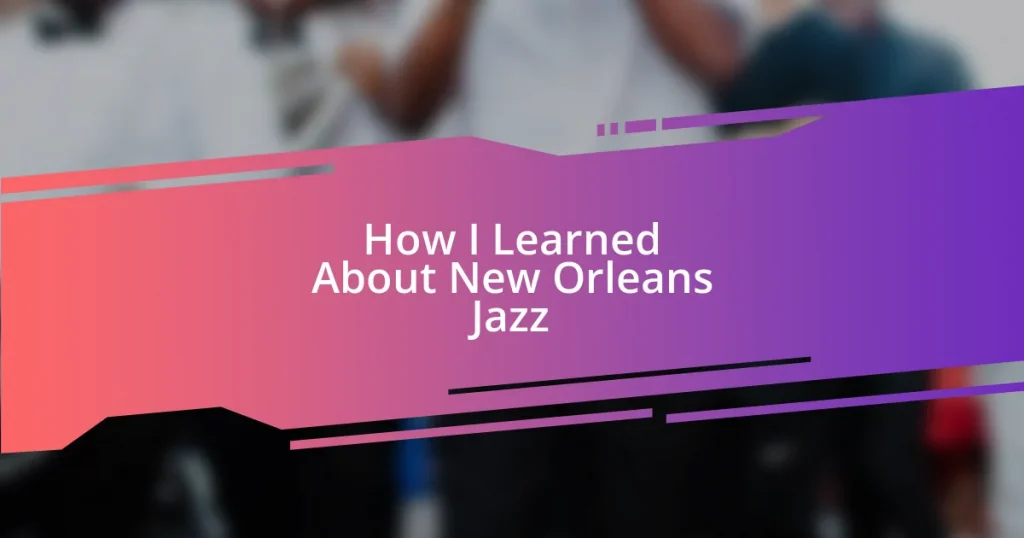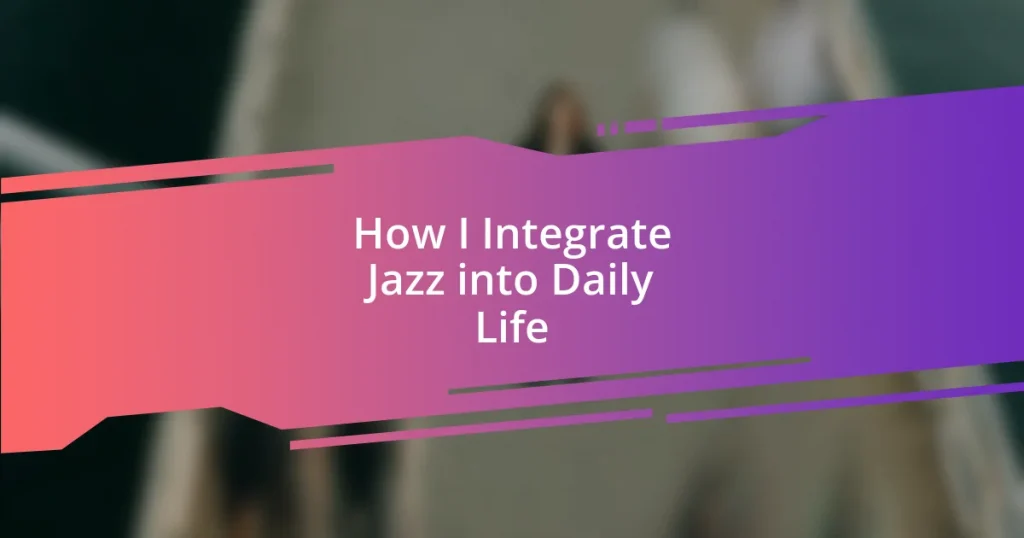Key takeaways:
- Jazz mentorship encompasses emotional insights and storytelling, emphasizing authenticity and growth for both mentor and mentee.
- Learning from mentors provides personalized feedback, emotional support, and valuable networking opportunities, shaping artistic identity.
- Continued mentorship fosters community through shared experiences, encouraging the next generation of musicians to explore their unique voices.
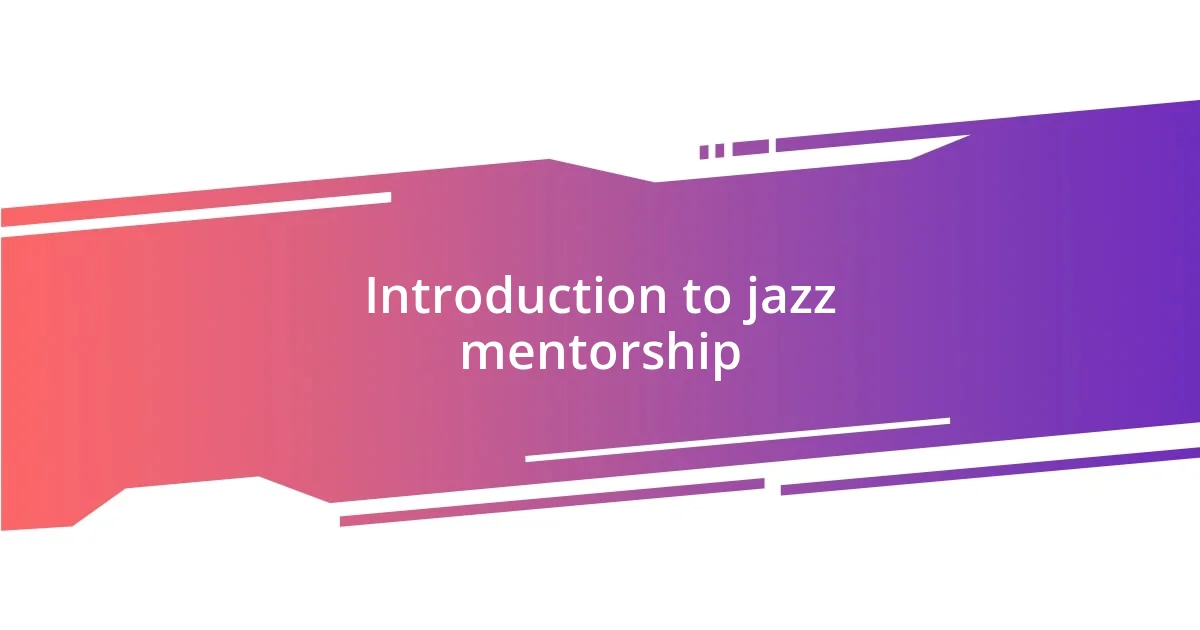
Introduction to jazz mentorship
Jazz mentorship is a unique and profound journey that extends beyond technical skills; it’s about the stories, the emotions, and the connections we forge along the way. I remember my first encounter with a seasoned jazz musician who shared not just their profound knowledge of scales and improvisation— but also the stories behind their favorite pieces, painting vivid images in my mind. Isn’t it incredible how a simple melody can encapsulate years of experience and passion?
Through my experience, I’ve learned that jazz mentorship involves a reciprocal relationship, where both the mentor and mentee grow. I vividly recall a late-night jam session where my mentor encouraged me to take risks and express my feelings through music. The excitement of improvising together in that intimate setting is something I still cherish. How often do we find ourselves in situations where we’re pushed beyond our comfort zone, only to discover our true potential?
Emotional insights play a pivotal role in jazz mentorship, shaping the way we interpret and connect with the music. I often find myself reflecting on my mentor’s insistence on authenticity; it resonated deeply with me as I struggled to find my voice. I often ask myself, how do we truly convey our emotions through jazz? The answer lies in collaboration and the shared experiences that help us grow as musicians and individuals.
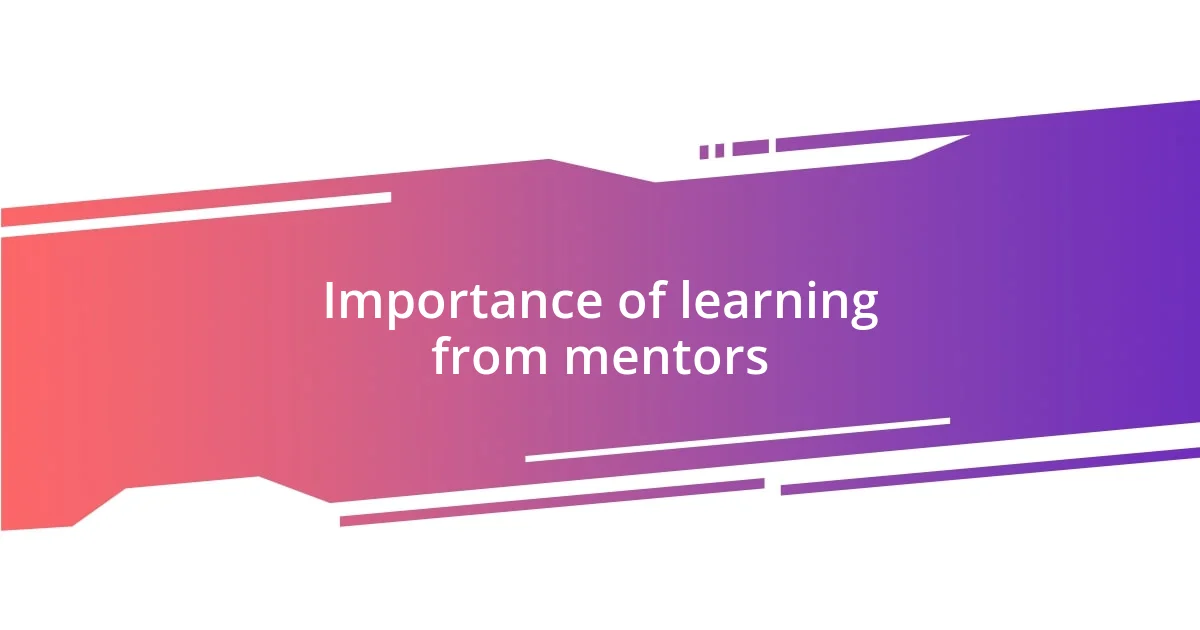
Importance of learning from mentors
Learning from mentors is immensely important, as their guidance can shape our artistic identity in ways we often don’t anticipate. I recall sitting in a small café, captivated by my mentor’s insights on interpreting standards. It became clear to me that their wisdom wasn’t just about playing the right notes, but understanding the emotions behind them. This nuanced perspective encouraged me to dig deeper within myself and seek my unique expression in every performance.
Mentorship fosters growth by providing a safe environment to make mistakes and learn from them. Here are some key reasons why learning from mentors is invaluable:
- Personalized Feedback: Mentors offer tailored advice based on their experience, helping you refine your skills.
- Emotional Support: They understand the journey and provide encouragement when self-doubt sneaks in.
- Networking Opportunities: Mentors introduce you to new circles, expanding your musical community.
- Insight into the Industry: Their firsthand experiences shed light on navigating the complexities of the music world.
- Inspiring Stories: Hearing their journey can motivate you, showing that challenges can lead to greatness.
I remember my mentor sharing a heartfelt story of rejection and resilience that not only inspired me but also reinforced the importance of perseverance in pursuing jazz. This connection isn’t just about music; it’s about the shared journey of growth and understanding.
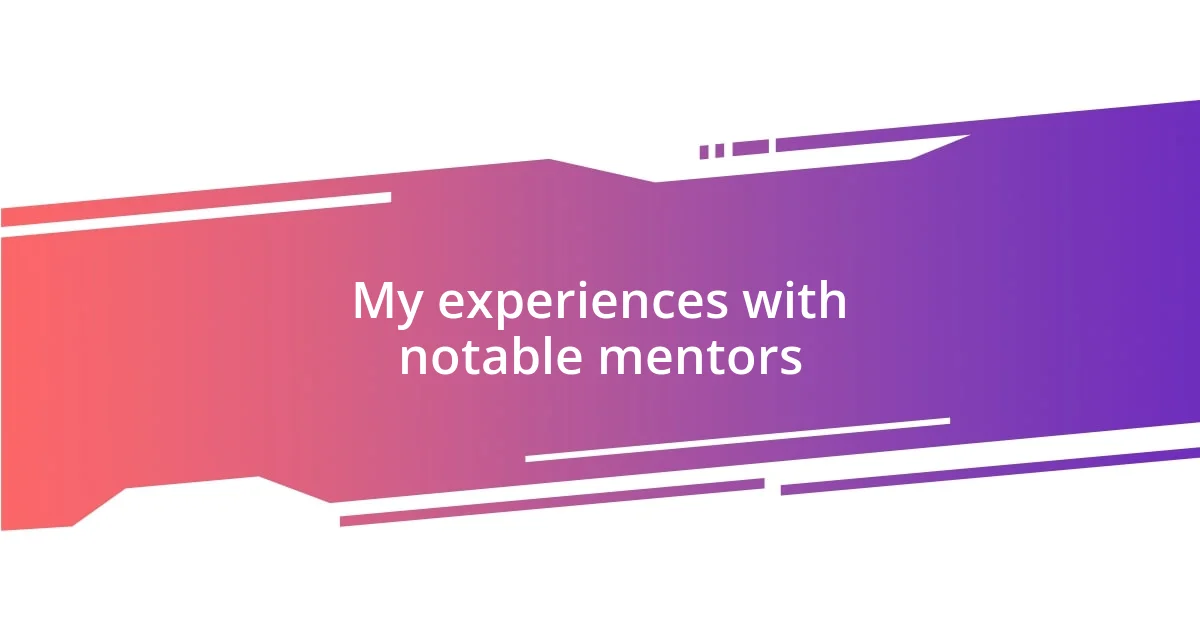
My experiences with notable mentors
I’ve had the privilege of learning from some truly remarkable jazz mentors, each contributing uniquely to my journey. One particular mentor, an accomplished saxophonist, took me under his wing during a summer workshop. I vividly remember watching him take a single note and turn it into a soulful cry, reflecting his life experiences. This taught me that jazz is as much about storytelling as it is about technique. How incredible is it to realize that every note can echo a cherished memory?
Another memorable encounter was with a pianist who emphasized the importance of listening—truly listening—to both yourself and your fellow musicians during a performance. I recall a time when she paused our practice mid-song to challenge me to hear the rhythm in my partner’s play. That moment opened my ears and my heart to the nuances of our collaboration. Reflecting on those teachings, I often wonder, how does one develop the ability to listen beyond the notes? I believe it comes through the trust and understanding cultivated in mentorship.
Additionally, I learned that every mentor offers a chance to reflect on my own path and choices. In a heartfelt discussion with a revered jazz educator, he shared his philosophy on embracing failure as a stepping stone to success. That conversation encouraged me to view my missteps not as setbacks but as valuable lessons. It’s remarkable how these experiences with my mentors have shaped my views on resilience in jazz and life.
| Mentor | Key Lesson |
|---|---|
| Saxophonist | Jazz as storytelling |
| Pianist | The art of listening |
| Jazz Educator | Embracing failure as growth |
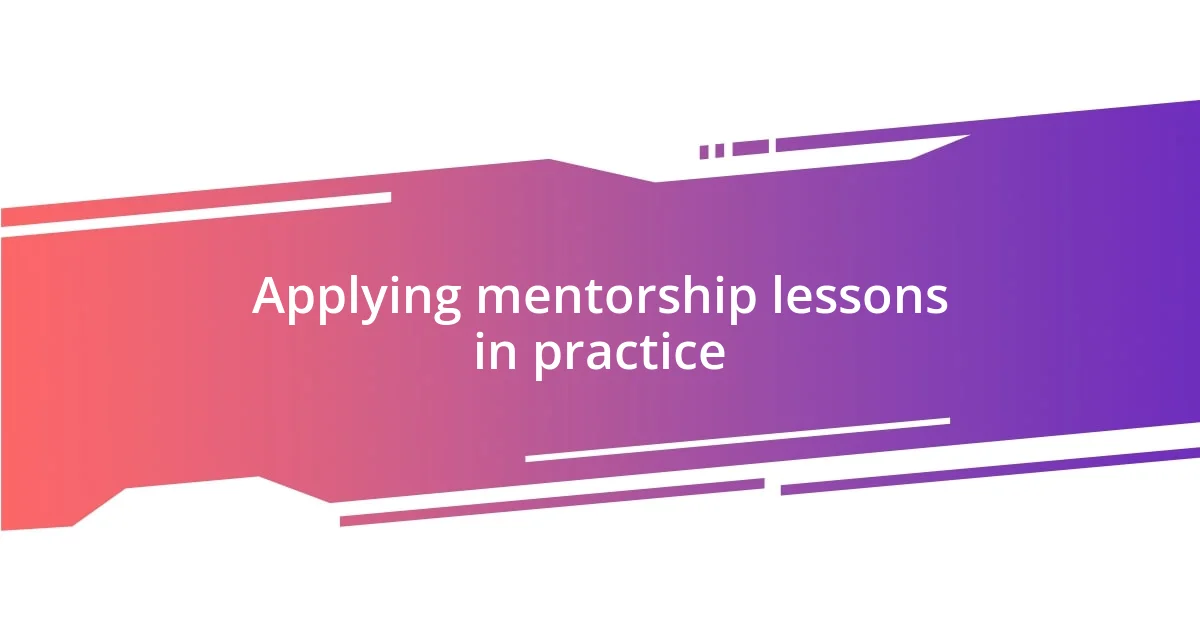
Applying mentorship lessons in practice
One of the most transformative lessons I learned from my mentors was the power of intentional practice. I remember a late-night jam session when my mentor reminded me, “It’s not about how long you practice; it’s about how you practice.” This prompted me to focus on specific techniques rather than just playing through songs. I began to approach each practice session with a purpose, isolating challenging sections and drilling them until they felt natural. This shift not only enhanced my skills but also deepened my understanding of the music itself. Have you ever felt stuck in your progress? Focusing on intentionality really can be a breakthrough.
Another important lesson is the significance of vulnerability in performances. During a workshop, I hesitated before sharing an improvised piece. However, my mentor encouraged me, saying, “Jazz thrives on honesty. Let them feel your spirit!” Taking those words to heart, I stepped into the spotlight. The rush of sharing something so personal was exhilarating. It taught me that opening up on stage is not just a performance—it’s an invitation for the audience to connect. How often do we shy away from showing our true selves? I’ve found that embracing vulnerability often leads to the most profound musical moments.
Lastly, I truly grasped the value of collaboration. I recall a session where my mentor paired me with a guitarist I had never met. Initially, I was apprehensive, unsure how our styles would mesh. To my surprise, we created something beautiful without prior discussion. This experience reinforced the idea that great music often blooms through unexpected partnerships. In a world where we can easily become siloed within our styles, how important is it to step out of our comfort zones? It’s in those moments of collaboration that we often discover new dimensions of our artistry.
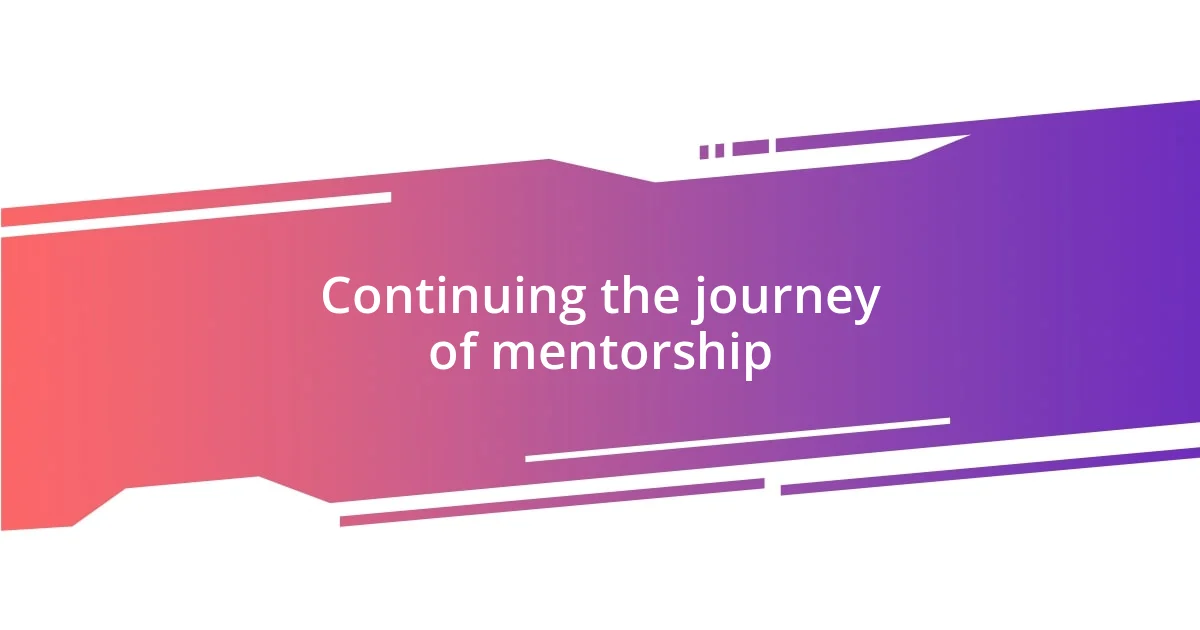
Continuing the journey of mentorship
The journey of mentorship is not just about receiving wisdom; it’s about passing it forward. I remember a moment when I was invited to share my experiences with a group of young musicians. While I was initially nervous, I found joy in seeing their eager eyes and bright smiles. It hit me: each encounter is an opportunity—one that fosters growth not just in others, but for myself as well. Can you recall a time when you felt empowered by sharing your knowledge? That feeling is truly rewarding.
Reflecting on how mentorship continues beyond the initial lessons, I often reconnect with mentors to share how their teachings have influenced my path. Recently, I reached out to my saxophonist mentor, revealing how his concept of storytelling in music shaped my compositions. Hearing his pride in my progress filled me with a sense of belonging. It made me ponder, how can we maintain these valuable connections over time? I believe it’s through ongoing dialogue and mutual support—keeping the mentorship alive.
Mentorship also prompts a cycle of learning that extends into community. I’ve taken to organizing jam sessions for aspiring musicians, encouraging them to explore their unique voices while supporting one another. Witnessing the camaraderie and excitement in those rooms reminds me of my own early experiences. Can you sense the energy of budding talent? It’s electric! By fostering these environments, we create spaces where mentorship flourishes, ensuring that each generation can pick up where the last left off.
